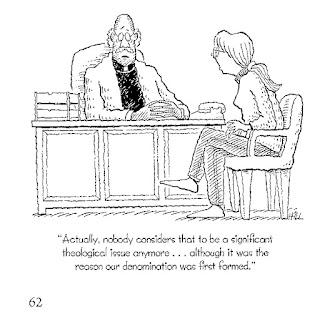 |
| Marc Chagall: David Weeps for Absalom |
Five Times
Five times he calls his son.
Five times he names the one
About whom he had spake:
"Deal gently for my sake
With the young man." But he
Died hanging from a tree,
The forest something like
God's will; although the strike
From Joab's men ensured
The kingdom be secured.
Thus David's grief, not brief,
Becomes the new motif
Describing David, king,
Who, living, felt the sting
Of judgment, self-declared,
Though shepherd king was spared.
He knows that Yahweh's choice
Now calls him to rejoice,
Since chosen from above
Means love,
love,
love,
love,
love.
Scott L. Barton
The king ordered Joab and Abishai and Ittai, saying, “Deal gently for my sake with the young man Absalom.” And all the people heard when the king gave orders to all the commanders concerning Absalom. So the army went out into the field against Israel; and the battle was fought in the forest of Ephraim. The men of Israel were defeated there by the servants of David, and the slaughter there was great on that day, twenty thousand men. The battle spread over the face of all the country; and the forest claimed more victims that day than the sword.
Absalom happened to meet the servants of David. Absalom was riding on his mule, and the mule went under the thick branches of a great oak. His head caught fast in the oak, and he was left hanging between heaven and earth, while the mule that was under him went on. And ten young men, Joab’s armor-bearers, surrounded Absalom and struck him, and killed him. Then the Cushite came; and the Cushite said, “Good tidings for my lord the king! For the Lord has vindicated you this day, delivering you from the power of all who rose up against you.” The king said to the Cushite, “Is it well with the young man Absalom?” The Cushite answered, “May the enemies of my lord the king, and all who rise up to do you harm, be like that young man.” The king was deeply moved, and went up to the chamber over the gate, and wept; and as he went, he said, “O my son Absalom, my son, my son Absalom! Would I had died instead of you, O Absalom, my son, my son!”





